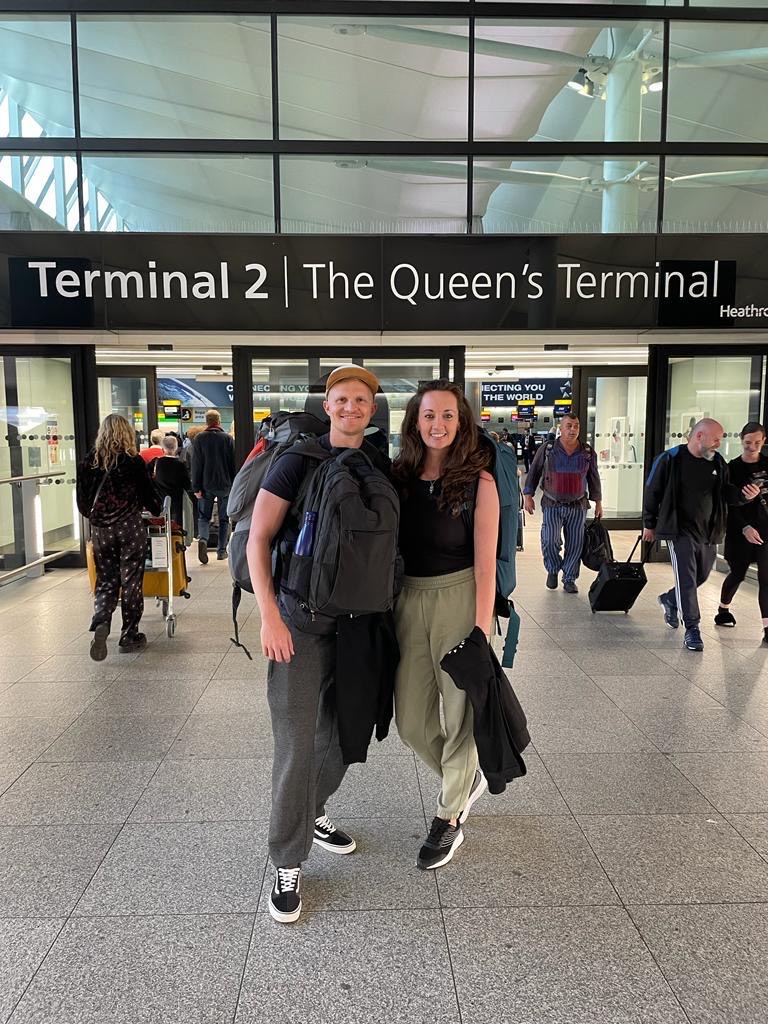 Before discovering my love of journalism and writing could actually lead to a career, I had planned to become a teacher. An English teacher to be precise. When I went to university to study English literature with language and communication, that is what I wanted to do when I finished. I loved the idea of becoming that teacher who really inspires you, I was lucky enough to have a few like this who really spurred me on and inspired my love of learning from the very beginning to my last days in education. With two parents who both ended up working as lecturers in healthcare at a university and college near where I live, it seemed inevitable that I would inherit some of their teacher ways.
Before discovering my love of journalism and writing could actually lead to a career, I had planned to become a teacher. An English teacher to be precise. When I went to university to study English literature with language and communication, that is what I wanted to do when I finished. I loved the idea of becoming that teacher who really inspires you, I was lucky enough to have a few like this who really spurred me on and inspired my love of learning from the very beginning to my last days in education. With two parents who both ended up working as lecturers in healthcare at a university and college near where I live, it seemed inevitable that I would inherit some of their teacher ways.
But I have to be honest, there was one thing in the back of my mind that put me off the idea of teaching, something that became a pet peeve of mine throughout later education - it was the attitude of students in the UK. Now don't get me wrong, I know there are many wonderful students out there who are eager to learn and develop. I also know there are many incredible teachers out there, some of them are friends of mine who stuck it out and are now working in schools across the country. But there are two factors in the UK that seem to be putting an extortionate amount of pressure on both sides, preventing them from being the best they can be and in some cases, stopping them from loving their job or learning. My concern lies with the government who are putting such ridiculous pressure and demands on teachers that they barely have time to notice when there are concerns over wellbeing of their students. The sheer amount of paperwork and time spent on fulfilling guidelines means often, as I have heard from some teachers firsthand, they don't feel they are doing their jobs properly and are sometimes expected to lie in order to fulfil certain criteria. It is ridiculous and I can't imagine I would cope well with such pressure, I have huge admiration for those who do on a daily basis.
My concern lies with the government who are putting such ridiculous pressure and demands on teachers that they barely have time to notice when there are concerns over wellbeing of their students. The sheer amount of paperwork and time spent on fulfilling guidelines means often, as I have heard from some teachers firsthand, they don't feel they are doing their jobs properly and are sometimes expected to lie in order to fulfil certain criteria. It is ridiculous and I can't imagine I would cope well with such pressure, I have huge admiration for those who do on a daily basis.
The other big issue lies with the sense of entitlement in the UK - it really hit me when I came away and met so many people from various countries. I realised how much more dedicated they seem as students - how the majority of people I have met speak three or more languages fluently while most English people I meet seem to have only mastered English in their 18 years of education. How some people have gone to such lengths to achieve an education - like the Vietnamese woman who searched at length to find a scholarship programme so she could study in America for her PHD, studying in a different language, culture and on a new continent to become a doctor. It's inspiring to meet such people out here, but I can't help but feel a bit embarrassed when you think of the naughty students at home who used to disrupt the classroom and refuse to learn, who don't see the value in learning languages or maths and don't think past finishing school. While staying at Elephant Nature Park, we were asked to take part in an education programme run by the sanctuary by giving a morning up to go to the local school and teach English. The Park is very involved in the local villages as many of the men and women work at the Park and staff there make sure their children are sent to school, it's not just about the elephants - it's about ensuring a better way of life and a future for all involved. I jumped at the opportunity - teaching English abroad is something I've wanted to do for a while after knowing so many who have raved about the experience and how amazing it was. I chose a day in the middle of the week and was really looking forward to it. On the day, four of us volunteers headed out on a minibus to the village school where we were welcomed by the headteacher who was warm and friendly.
While staying at Elephant Nature Park, we were asked to take part in an education programme run by the sanctuary by giving a morning up to go to the local school and teach English. The Park is very involved in the local villages as many of the men and women work at the Park and staff there make sure their children are sent to school, it's not just about the elephants - it's about ensuring a better way of life and a future for all involved. I jumped at the opportunity - teaching English abroad is something I've wanted to do for a while after knowing so many who have raved about the experience and how amazing it was. I chose a day in the middle of the week and was really looking forward to it. On the day, four of us volunteers headed out on a minibus to the village school where we were welcomed by the headteacher who was warm and friendly.
The school was a bit of a building site with construction ongoing in the middle, but the classrooms were laid out around a giant courtyard, they were bright and colourful. A quick decision was made, we would be spread across three classrooms and I was thrilled to have a class all to myself - I would be teaching students ranging from five to 18-years-old with the help of a local teacher who spoke minimal English. I love being thrown in at the deep end so this suited me perfectly, after checking out their workbooks for a clue of where they were up to in their studies, and after meeting the adorable, giggling students, I was ready to start. We ran through simple concepts they already knew slightly such as colours, foods, verbs, basic phrases and conversation, and had a good sing-song ones like head, shoulder, knees and toes, twinkle twinkle little star, the alphabet song and a few others. I was really impressed with what they already knew, it suggested their ability was much higher than I had anticipated which was great. The older and more fluent speakers were helping the younger ones to understand which meant we worked well together as a group and gave me the chance to try some trickier stuff with them later on. I had the most amazing time with the children that morning and felt like we were making so much progress that I couldn't resist staying for the afternoon when the other volunteers went back to the Park. After a lunchtime spent meeting the other children at the school, joining in a jam session with them, playing ping pong and chatting to the young girls, we were ready for round two. The classrooms were a lot stuffier in the heat of the day and you could tell the children were getting tired, but that didn't stop them for a second in their determination to learn and impress me. It was lovely to see how dedicated they were when I know full well that children in the UK would have been far more disruptive in the heat.
I had the most amazing time with the children that morning and felt like we were making so much progress that I couldn't resist staying for the afternoon when the other volunteers went back to the Park. After a lunchtime spent meeting the other children at the school, joining in a jam session with them, playing ping pong and chatting to the young girls, we were ready for round two. The classrooms were a lot stuffier in the heat of the day and you could tell the children were getting tired, but that didn't stop them for a second in their determination to learn and impress me. It was lovely to see how dedicated they were when I know full well that children in the UK would have been far more disruptive in the heat.
That afternoon we covered past, present and future tenses, complex phrases, adverbs and more conversation. We also worked on longer passages, firstly for pronunciation and then for meaning of longer and more unusual words. We translated a piece about a science experiment using rockets and worked on the hardest piece of the day - discussing a passage about April Fool's Day. Trust me, that is a hard enough concept to explain in English and it was nearly impossible to non-native speakers! But we got there in the end and I was so proud to see how well the children did - they picked up so much and helped each other to understand which was amazing. It actually mad me think that teaching English abroad might be something I would like to try for a while in the future. If you get an opportunity to go into a school while travelling and teach - whether English, music, maths or something else, snatch it with both hands. Even if you don't think you have the knowledge to do it, they can learn so much from you and it is such a rewarding experience. Often you don't need to have done a TEFL course and village schools will just have signs up asking for volunteers to come in, ask at your hostel and read notices. A friend of mine spotted a notice asking for those who can play musical instruments to come into a music course and help teach, he could play the guitar and jumped at the chance. Afterwards he said it was one of the best afternoons he has had travelling, that it was so much fun and they were wonderful students. It's a great way to give something back and if you choose to do the TEFL course, it's a great way to earn money while travelling.
If you get an opportunity to go into a school while travelling and teach - whether English, music, maths or something else, snatch it with both hands. Even if you don't think you have the knowledge to do it, they can learn so much from you and it is such a rewarding experience. Often you don't need to have done a TEFL course and village schools will just have signs up asking for volunteers to come in, ask at your hostel and read notices. A friend of mine spotted a notice asking for those who can play musical instruments to come into a music course and help teach, he could play the guitar and jumped at the chance. Afterwards he said it was one of the best afternoons he has had travelling, that it was so much fun and they were wonderful students. It's a great way to give something back and if you choose to do the TEFL course, it's a great way to earn money while travelling.
Have you taught English while travelling? Tell me about your experiences and whether you would recommend doing it to others.














